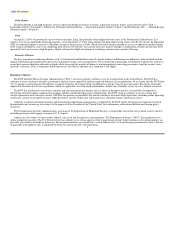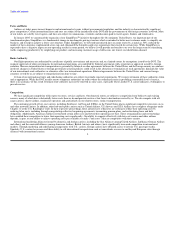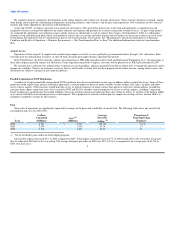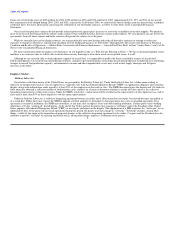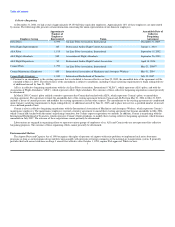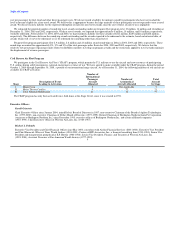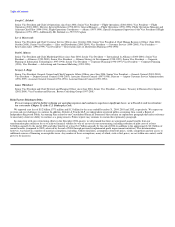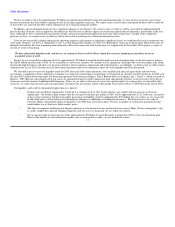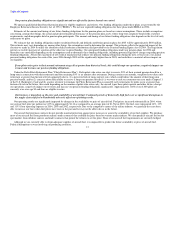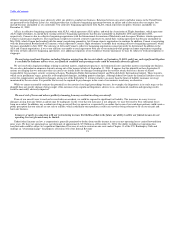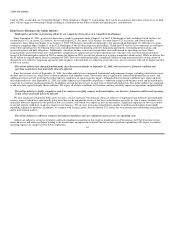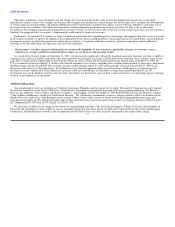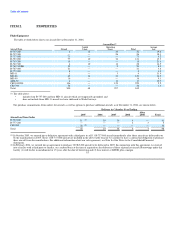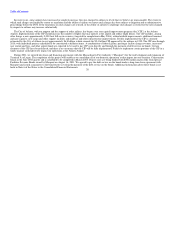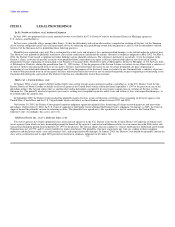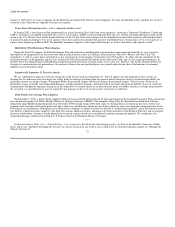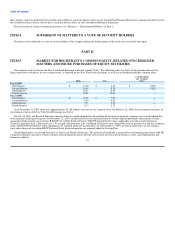Delta Airlines 2004 Annual Report Download - page 17
Download and view the complete annual report
Please find page 17 of the 2004 Delta Airlines annual report below. You can navigate through the pages in the report by either clicking on the pages listed below, or by using the keyword search tool below to find specific information within the annual report.
Table of Contents
Our pension plan funding obligations are significant and are affected by factors beyond our control.
We sponsor qualified defined benefit pension plans for eligible employees and retirees. Our funding obligations under these plans are governed by the
Employee Retirement Income Security Act of 1974 ("ERISA"). We met our required funding obligations for these plans under ERISA in 2004.
Estimates of the amount and timing of our future funding obligations for the pension plans are based on various assumptions. These include assumptions
concerning, among other things, the actual and projected market performance of the pension plan assets; future long-term corporate bond yields; statutory
requirements; and demographic data for pension plan participants. The amount and timing of our future funding obligations also depends on the level of early
retirements by pilots.
We estimate that our funding obligations under our defined benefit and defined contribution pension plans for 2005 will be approximately $450 million.
This estimate may vary depending on, among other things, the assumptions used to determine the amount. This estimate reflects the projected impact of the
election we made in 2004 to utilize the alternative deficit reduction contribution relief provided by the Pension Funding Equity Act of 2004. That legislation
permits us to defer payment of a portion of the otherwise required funding. Our anticipated funding obligations under our pension plans for 2006 and
thereafter vary materially depending on the assumptions used to determine these funding obligations, including potential legislative changes regarding pension
funding obligations. Absent the enactment of new federal legislation that reduces our pension funding obligations during the next several years, our annual
pension funding obligations for each of the years 2006 through 2009 will be significantly higher than in 2005, and could have a material adverse impact on
our liquidity.
If our pilots retire prior to their normal retirement at age 60 at greater than historical levels, this could disrupt our operations, negatively impact our
revenue and increase our pension funding obligations.
Under the Delta Pilots Retirement Plan ("Pilots Retirement Plan"), Delta pilots who retire can elect to receive 50% of their accrued pension benefit in a
lump sum in connection with their retirement and the remaining 50% as an annuity after retirement. During certain recent months, our pilots have taken early
retirement at greater than historical levels apparently due to (1) a perceived risk of rising interest rates, which could reduce the amount of their lump sum
pension benefit; and/or (2) concerns about their ability to receive a lump sum pension benefit if (a) we were to seek to restructure our costs under Chapter 11
of the U.S. Bankruptcy Code and (b) a notice of intent to terminate the Pilots Retirement Plan is issued. If early retirements by pilots occur at greater than
historical levels in the future, this could, depending on the number of pilots who retire early, the aircraft types these pilots operate and other factors, disrupt
our operations, negatively impact our revenues and increase our pension funding obligations significantly. Approximately 1,800 of our 6,400 pilots are
currently at or over age 50 and thus are eligible to retire.
Our business is dependent on the price and availability of aircraft fuel. Continued periods of historically high fuel costs or significant disruptions in
the supply of aircraft fuel will materially adversely affect our operating results.
Our operating results are significantly impacted by changes in the availability or price of aircraft fuel. Fuel prices increased substantially in 2004, when
our average fuel price per gallon rose 42% to approximately $1.16 as compared to an average price of 81.78¢ in 2003. Our fuel costs represented 16%, 13%
and 11% of our operating expenses in 2004, 2003 and 2002, respectively. Due to the competitive nature of the airline industry, we generally have not been
able to increase our fares when fuel prices have risen in the past and we may not be able to do so in the future.
Our aircraft fuel purchase contracts do not provide material protection against price increases or assure the availability of our fuel supplies. We purchase
most of our aircraft fuel from petroleum refiners under contracts that establish the price based on various market indices. We also purchase aircraft fuel on the
spot market, from offshore sources and under contracts that permit the refiners to set the price. None of our aircraft fuel requirements are currently hedged.
Although we are currently able to obtain adequate supplies of aircraft fuel, it is impossible to predict the future availability or price of aircraft fuel.
Political disruptions or wars involving oil-producing countries, 13


